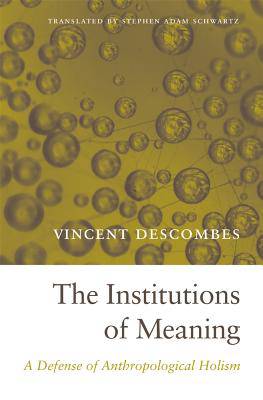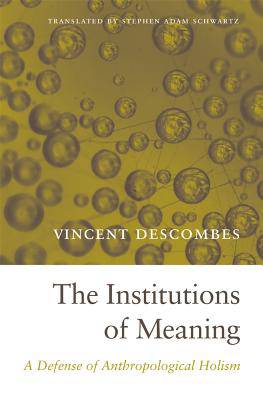
- Afhalen na 1 uur in een winkel met voorraad
- Gratis thuislevering in België vanaf € 30
- Ruim aanbod met 7 miljoen producten
- Afhalen na 1 uur in een winkel met voorraad
- Gratis thuislevering in België vanaf € 30
- Ruim aanbod met 7 miljoen producten
Omschrijving
Holism grows out of the philosophical position that an object or phenomenon is more than the sum of its parts. And yet analysis--a mental process crucial to human comprehension--involves breaking something down into its components, dismantling the whole in order to grasp it piecemeal and relationally. Wading through such quandaries with grace and precision, The Institutions of Meaning guides readers to a deepened appreciation of the entity that ultimately enables human understanding: the mind itself.
This major work from one of France's most innovative philosophers goes against the grain of analytic philosophy in arguing for the view known as anthropological holism. Meaning is not fundamentally a property of mental representations, Vincent Descombes says. Rather, it arises out of thought that is holistic, embedded in social existence, and bound up with the common practices that shape the way we act and talk.
To understand what an individual "believes" or "wants"--to apply psychological words to a person--we must take into account the full historical and institutional context of a person's life. But how can two people share the same thought if they do not share the same system of belief? Descombes solves this problem by developing a logic of relations that explains the ability of humans to analyze structures based on their parts. Integrating insights from anthropology, linguistics, and social theory, The Institutions of Meaning pushes philosophy forward in bold new directions.
Specificaties
Betrokkenen
- Auteur(s):
- Uitgeverij:
Inhoud
- Aantal bladzijden:
- 392
- Taal:
- Engels
Eigenschappen
- Productcode (EAN):
- 9780674728783
- Verschijningsdatum:
- 11/03/2014
- Uitvoering:
- Hardcover
- Formaat:
- Genaaid
- Afmetingen:
- 167 mm x 243 mm
- Gewicht:
- 721 g

Alleen bij Standaard Boekhandel
Beoordelingen
We publiceren alleen reviews die voldoen aan de voorwaarden voor reviews. Bekijk onze voorwaarden voor reviews.











